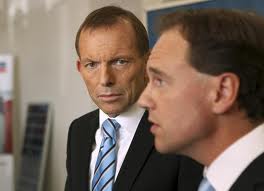The Coalition government’s efforts to dismantle the various pieces of the climate change policy infrastructure has hit a series of major roadblocks, and are proving more difficult to put into practice than simple sloganeering.
Institutions that the Abbott government had vowed to dismantle, such as the Climate Change Authority and the Clean Energy Finance Corp, are proving difficult to dislodge. Even Tim Flannery’s Climate Commission has reappeared with a new name and private funding.
Environment Minister Greg Hunt was forced to concede on Monday that the Climate Change Authority, which is about to deliver a draft report on emission caps and reduction targets, would be allowed to continue its work.
“We have been clear the role of the Climate Change Authority will cease, but until it does, it can continue with its work,” Hunt told ABC TV’s Lateline program on Monday night. “They have a charter, and I don’t want to interfere with that charter.”
In practise, the government has no choice. The CCA can only be dismantled by legislation, and that cannot be introduced before parliament resumes, most likely in November. In any case, any act to repeal will likely be rejected in the Senate, where Labor and the Greens still have the numbers.
The CCA report is likely to be embarrassing for the Abbott government, because it will likely recommend a reduction target of at least 15 per cent. Most analysts believe Abbott’s Direct Action strategy, which is yet to be defined, will struggle to reach even a 5 per cent target.
However, Hunt’s office is insisting that the CCA will not conduct the next review of the Renewable Energy Target, which the new government is insisting takes place next year, even though the uncertainty the new review has caused has brought a halt to large scale investments.
The CCA conducted the last review, and dismissed arguments raised by state and privately owned generators and network operators, who want the renewable target diluted to protect their earnings and profits.
“It is the intention of the government that the Climate Change Authority would not undertake the RET review,” a spokesperson for Hunt said by email. However, it was not clear which organization would do the review in its place, or if that would be allowed by current legislation.
Hunt told Lateline that he would be speaking with CCA chairman Bernie Fraser in the coming days. Fraser was critical of the Abbott government after delivering its RET review in December, suggesting it would be swayed by lobbying from the fossil fuel industry.”
Those comments are believed to have infuriated the Coalition, which has already sacked several key public servants, including former climate change department head Blair Comley, who were considered a threat to the government.
The CEFC also can only be dismantled by an act of parliament, although its board has decided to hold off on new investments in the hope that a compromise position can be negotiated. The government does have some discretion of how the CEFC invests its funds, and there is speculation that the CEFC could be rebadged and enlisted to support its Direct Action policy – by providing finance for emission reduction projects approved by the government.
Flannery, meanwhile, has emerged as another fly in the ointment. The Climate Commission was closed within 24 hours of Hunt being sworn in as minister, just a week before the Intergovernmental Panel on Climate Change releases its first report since 2007.
That decision has been criticized and lampooned, and Flannery said on Tuesday it had clearly touched a nerve in the community, as he and fellow commissioners had been overwhelmed with offers of support.
The newly formed Climate Council will source funds from private donors and the community, and Flannery says he and other commissioners will work pro-bono, at least for the time being. Their first task will be to report on the IPCC’s work.
”We’ve developed a real reputation for independence and authority in this area, and we just want to continue with that job. We haven’t seen any plans from the government to provide an alternative,” he told smh.com.au










